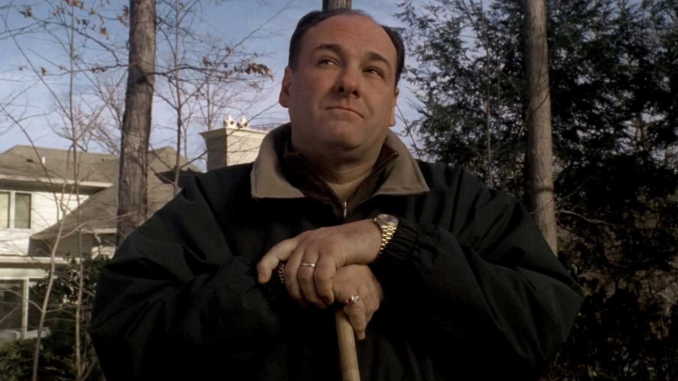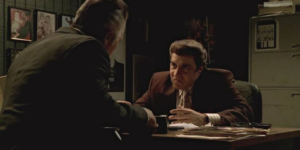
Introduction: The Rise of Peak TV Through The Sopranos and The Wire
When we talk about Peak TV, we’re referring to a period where television transcended its humble origins and became a true art form. Two shows often hailed as the cornerstones of this revolution are The Sopranos and The Wire. These groundbreaking series set the stage for the modern era of TV drama, influencing countless shows that followed. But how exactly did The Sopranos and The Wire achieve this monumental shift?
In this article, we’ll explore how these two iconic series changed the landscape of television, raised the bar for storytelling, and laid the foundation for the “Golden Age” of TV we know today.

What Is Peak TV?
Before we dive into how The Sopranos and The Wire paved the way for Peak TV, let’s first understand what “Peak TV” means. Simply put, Peak TV refers to a time when television programming reached an unprecedented level of quality, diversity, and artistic ambition.
This era, typically considered to have started in the early 2000s, saw networks and streaming platforms investing heavily in original content. The results were shows that weren’t just entertaining but challenged social norms, explored complex characters, and offered deeper thematic depth than anything seen on television before.
How The Sopranos Pioneered the Peak TV Movement
When The Sopranos premiered on HBO in 1999, it was a game-changer. It wasn’t just a mob drama—it was a show that broke all the rules of traditional TV, setting the tone for everything that followed. Here’s how:
Complex Characters: Tony Soprano, The Anti-Hero of a Generation
At the center of The Sopranos was Tony Soprano, a mob boss who struggles with both his criminal empire and his personal life. Tony wasn’t your typical protagonist; he was morally ambiguous, grappling with his demons, from anxiety attacks to his tumultuous family life. His character, played masterfully by James Gandolfini, was a complete departure from the one-dimensional gangsters audiences were used to.
This shift towards morally complex characters was a revolutionary move in television. The Sopranos showed that protagonists didn’t have to be good guys to be compelling. In fact, they could be flawed, multi-dimensional, and still capture the audience’s loyalty. The show made the anti-hero a staple of modern TV storytelling.
Unconventional Storytelling: Breaking the Traditional TV Mold
Another key element of The Sopranos’ success was its approach to storytelling. The show didn’t follow traditional episodic formats where each episode wrapped up neatly with a resolution. Instead, it embraced long-term story arcs, building tension over multiple seasons and making the audience invest deeply in the characters’ journeys.
The use of dream sequences, ambiguous endings, and subtle social commentary also set the series apart. These elements broke from the formulaic, procedural structure that dominated network TV at the time and helped pave the way for more ambitious storytelling on the small screen.
Redefining Television Production and Budgeting
The Sopranos also marked a shift in how TV shows were produced. The show was known for its high production values, cinematic quality, and attention to detail. HBO spared no expense in creating a world that felt as authentic as possible. This set a new precedent for what TV shows could achieve in terms of visuals, sound, and overall production quality.
The series raised the bar for television budgets, inspiring networks and streaming services to invest more in premium content.
How The Wire Took It a Step Further
While The Sopranos was redefining television in the realm of character complexity and narrative structure, The Wire, which aired from 2002 to 2008, raised the stakes even further in terms of social realism and narrative depth. Created by David Simon, a former journalist, The Wire was a stark portrayal of life in Baltimore through the eyes of both law enforcement and the drug trade.
A Critique of Society: Realism and Social Commentary
Unlike traditional crime dramas that often glamorized the lives of criminals, The Wire aimed to depict the harsh realities of inner-city life. It was a show that didn’t shy away from portraying the failings of the American system, whether in education, law enforcement, or politics. Each season tackled a different aspect of Baltimore’s complex social fabric, offering a critique of society that was both sobering and eye-opening.
Ensemble Cast and Complex Storytelling
The Wire was known for its sprawling ensemble cast, which gave voice to a wide range of characters from all walks of life. This multi-perspective approach was revolutionary at the time. Instead of focusing on one or two central characters, The Wire painted a broad, interconnected portrait of an entire city, with each storyline contributing to a larger narrative.
The show’s refusal to simplify its characters into “good guys” or “bad guys” added to its realism. The drug dealers, police officers, politicians, and teachers were all portrayed with shades of gray, making the viewer question where the true moral boundaries lay.
The Influence of The Wire on Modern TV Drama
The Wire has been hailed as one of the most influential TV series of all time, often cited as a precursor to the types of shows we now see on platforms like HBO, AMC, and Netflix. The series’ commitment to realism, its portrayal of systemic issues, and its refusal to cater to traditional TV conventions all made it a blueprint for future generations of television writers and showrunners.
The Intersection of The Sopranos and The Wire: What They Have in Common
While both The Sopranos and The Wire have their own unique identities, they share several key qualities that helped elevate them to the status of Peak TV:
Breaking Away From Traditional TV Conventions
Both shows were unafraid to push the boundaries of traditional TV. The Sopranos did this by offering complex characters and nuanced storytelling, while The Wire offered an unflinching, multi-faceted look at a city’s troubled institutions.
Both shows prioritized character development over episodic plots, weaving long-term narratives that required a dedicated viewer to fully appreciate. In doing so, they laid the groundwork for other long-form dramas like Breaking Bad, Mad Men, and Better Call Saul.
High Production Values and Cinematic Appeal
Both The Sopranos and The Wire redefined what was possible on television from a production standpoint. The Sopranos set a new standard for visual storytelling in television, while The Wire took a more gritty, realistic approach. These high production values created shows that felt as polished and immersive as high-end cinema, blurring the lines between television and film.
Moral Ambiguity and Character Complexity
One of the most lasting legacies of these two shows is the focus on morally ambiguous characters. The Sopranos introduced us to the anti-hero in the form of Tony Soprano, while The Wire showed us how even those in positions of authority could be just as morally compromised as the criminals they pursued. This shift away from clear-cut heroes and villains paved the way for the complex characters we see in today’s television.
How These Shows Influenced Today’s Television Landscape
The legacy of The Sopranos and The Wire can be seen in nearly every high-quality drama that has come after them. From Breaking Bad to Mad Men, from The Handmaid’s Tale to Narcos, the influence of these two shows is undeniable.
By focusing on rich, multifaceted characters and embracing long-form storytelling, these series opened the door for modern “Golden Age” television, where creators are free to explore deeper, more nuanced narratives without the constraints of traditional TV formats.
Conclusion: The Lasting Legacy of The Sopranos and The Wire
The Sopranos and The Wire are not just TV shows—they are cultural milestones that changed the way we consume television. By challenging traditional formats, focusing on deep character studies, and embracing more realistic and complex narratives, these shows set the stage for the explosion of high-quality, prestige TV that followed.
Their impact is still felt today in the way shows are written, produced, and consumed. If you haven’t already, revisiting these two shows is a must for anyone who loves great television.
FAQs
1. What made The Sopranos so revolutionary for television?
The Sopranos was revolutionary because it introduced morally complex characters and long-term story arcs, raising the standard for character-driven drama and paving the way for modern TV.